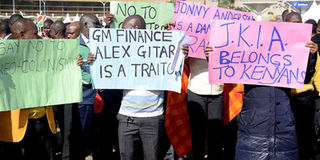Why strikes are losing their sting in evolving fight for workers’ rights

Kenya Aviation Workers Union members issue a strike notice on January 29, 2019 in protest to the planned takeover of JKIA by Kenya Airways. With the collapse of every industrial action, employers are getting emboldened. PHOTO | FILE | NATION MEDIA GROUP
What you need to know:
- Oversupply of young, educated and readily available labour is not making matters any better for trade unions with strike mentality.
- Unions, employers and the government must revisit the preamble to our Constitution on nurturing and protecting the well-being of the individual and family.
The strike called by the Kenya Aviation Workers Union (Kawu) recently collapsed and the union officials were humiliated by spending days in police custody for contempt of court.
The union was protesting plans to hand over the management of the Jomo Kenyatta International Airport to the ailing Kenya Airways, a private company with strategic and sentimental value to the country.
The Kawu strike came a few weeks after the Kenya National Union of Nurses’ industrial action that also crumbled.
The nurses put up a spirited fight for delayed payment of enhanced uniform and health risk allowances agreed on three years ago.
The Council of governors has since resolved to employ nurses on contract. From these examples, is Kenya becoming a country of failed strikes?
LOSING STEAM
In 2018, the infamous University Academic Staff Union (Uasu) industrial action collapsed after 76 days.
Even the incessant plea by Secretary-General Constantine Wesonga to members to upscale, escalate and intensify the strike did not stop lecturers from voluntarily returning to lecture halls, humbled.
The union officials, who rejected a Sh50 final offer from the government, were so embarrassed. This was the most shameful strike ever called by university academic staff.
There was no consultation with membership, no mobilisation. Officials could not even face members to explain their strategy.
Questions were met with a standard answer: Upscale, escalate and intensify the strike. By the time union officials called off the strike, they had lost their core constituency.
Union membership from the University of Nairobi Chapter paid a heavy price. For the first time, the university management denied striking staff, together with their families, medical care at the clinic and referral health facilities.
DIRGE SONG
This humiliating action was not only unlawful, it was also inhuman and immoral. The Uasu national office that called the strike never intervened, and ailing staff at the university were left at the mercy of God and the Vice Chancellor.
The university management later rescinded this directive, but the embarrassment of staff and their families had sunk and will never be forgotten.
Does it mean that a worker lawfully on strike loses the right to life? For many union members across the country, the rallying anthem, “solidarity forever/ For the union makes us strong”, has been transformed into a dirge sung over the graves of workers’ lost dreams.
It is becoming more predictable that no industrial action can compel the employer to listen to the demands of workers, more so in undemocratic and corrupt unions.
With the collapse of every industrial action, employers are getting emboldened.
RESTRATEGISE
Oversupply of young, educated and readily available labour is not making matters any better for trade unions with strike mentality.
Could something be amiss with our labour unions? What makes employers act with impunity? We need to ask difficult questions: What has changed in the trade union movement? Could it be that unions are using old strategies in a complex work environment?
Union leaders must retreat, research, reflect and restrategise to meaningfully engage employers who currently dictate terms.
Where is the solidarity of members, charisma and honesty of leaders, and sincerity of employers that characterised yesteryears?
Where are the promised gains of the 2010 Constitution for workers? Where are fair labour practices?
Genuine trade union leaders such as Francis Atwoli, Wilson Sossion and Ouma Oluga are few.
LAST RESORT
Previously, striking was the last weapon workers deployed. But could there be other ways of forcing employers to respect workers’ rights?
Trade union leaders should know that striking is a double-edged sword. It can force the employer to acquiescence or cause loss of jobs.
Consequently, it must be approached with caution instead of bravado alone. Some union officials use strikes to divert attention from internal lack of democracy, transparency and accountability.
Many unions are now divided into two classes: The rank and file who contribute monthly dues from their meagre salaries and the few officials who wait to share the “loot”.
Some arrogant union officials even operate as cartels to silence inquisitive members.
Unions, employers and the government must revisit the preamble to our Constitution on nurturing and protecting the well-being of the individual and family.
CHANGE
This is realised by, among others, fair labour practices as provided for in Article 41 of the 2010 Constitution and other laws.
Trade unionism must change with the times. The Fourth Industrial revolution has changed the labour market in favour of employers.
Union leaders must learn new skills to face a more emboldened, resourced and technology-empowered employer.
In the new dispensation, strikes as a weapon of corrupt and arrogant union officials is like an explosive in the hands of a juvenile. It harms many innocent workers.
The writer is a Literature and Law scholar at the University of Nairobi; pwasamba2019@gmailcom



